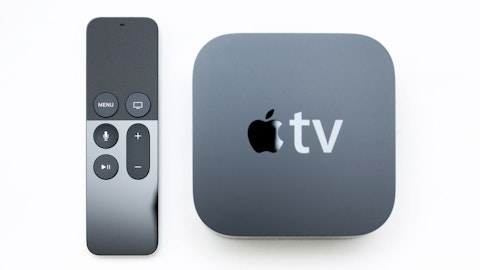But the only thing I can say is, to your point, with the assets that we have and the position that we’re in, other than the financial side of the markets, right, which is obviously a great challenge for us, we’re pretty well positioned for the 21st century. I mean, everything has got to be connected. Wireless is the only way you can do it on a mass basis, or certainly wired can do a lot but not everywhere. And we have a very modern system with a unique set of resources. So good management. We’ll be able to take that and operate that. And that’s certainly what we’re focused on, and we’ve maybe not been as good as we’d like to be but we think we’ve got the right team in place to do it.
Ben Swinburne: Okay. And if I could just ask a follow-up on a different topic, Charlie. The Pay-TV business is obviously important for you guys from a cash flow point of view, and you’ve been managing it that way for a long time. The Disney-Charter dispute this year or this quarter or this past quarter seemed to highlight some pretty big changes in that business. And I’m wondering if that has informed or highlighted or brought your attention to sort of opportunities to sort of either drop channels or run that business in a way that’s maybe more aggressive. You don’t have a broadband business or a different place than Charter, but you’ve also been arguably early on sort of paring off networks that don’t work anymore economically. I’m wondering if you took anything from that situation as you guys look ahead on Pay-TV. Thanks.
Gary Schanman: So this is Gary. Nice to meet you. Look, overall, we’re always looking at our relationships to see where we can partner strategically and where we can continue to with partners and help to improve the experience that’s available to customers. And yes, we’re also looking at where are our costs best spent and how we allocate capital efficiently. And so that’s an ongoing thing we’re looking at. It is important that we brought a good service to our subscribers to drive cash in the business and to make sure that they love us and they want to stay with us. But yes, we’re always looking at opportunities to be more efficient. And we were generally aligned with, I think, the positioning that Charter took in terms of understanding that certain parts of the model is broken.
And this company has done — taken those steps in the past, especially if you look at our history of RSNs. So we’ll continue to look at opportunistic ways to optimize our customer experience and our allocation of capital.
Operator: We will now take our final question from the analyst community. [Operator Instructions] We will begin the media portion of this call following the answer to final analyst question. Our final analyst question comes from Bryan Kraft with Deutsche Bank. Please go ahead.
Bryan Kraft: Can you talk about the expense outlook for the 5G business? I think there was a pretty sizable step-up in cost of sales this quarter. And I’m just trying to understand if we should think about that as a good run rate going forward or if there was anything that was maybe temporarily elevating it or if it could even go the other way, it might further step up in 4Q. And also, should we expect to see more revenue coming in on the 5G network side, or will you really be focusing the growth investments on retail postpaid? And then just lastly also on expenses. In Pay-TV, they didn’t really come down this quarter. And obviously, they need to keep pace with the revenue declines as much as possible. Are you planning to manage these costs down more aggressively, let’s say, over the next couple of quarters? Thank you.
Paul Orban: This is Paul here. I’ll take the 5G expense question. That grew due to the fact that we placed more towers in service, so you have the OpEx sets related to that. As we continue to place more towers in service in Q4 as well as the first part of next year, you’ll see that number grow. We are optimistic that we’ll be able to, at some point in the near future, start to monetize that network on top of subscribers and get revenue generation from a commercial perspective.
Gary Schanman: And this is Gary. On the video side, look, in terms of our sales and support costs, it’s a mature business and we’re always looking to manage our costs to match our subscriber and sales trends. And so we’ll regularly adjust how we allocate our resources to align with what we see in the market, and that’s kind of what we’d like to say about that.
Charles Ergen: Yes. And just a point, structurally, Gary had Sling but now you had Sling. Now he has all of Pay-TV. So structurally, what you have pointed out is a correct point of view, which is we haven’t managed costs down as well as — and part of it was structured in the company. Now Gary has got both sides of the fence there and it’s a little bit easier to work to right-size and the right people on the right projects without having to duplicate it, which is what we had to do. And the other part of it is as we combine with EchoStar, there’s some other opportunities for us within the organization as well, where we’ve got talented people on both sides and some synergy on the cost side.
Bryan Kraft: If I could ask just one follow-up. Can you talk about just what the pipeline looks like at this point on the 5G enterprise side in terms of private network RFPs and whether there’s a lot of activity there? Thank you.
Charles Ergen: I’d say it this way. There’s a lot of activity and I think there’s two challenges for us. One is the actual — the structure and personnel. We really haven’t found the replacement to Stephen Bye who’s now on our Board but was obviously on the enterprise side. So we got a little bit younger team that’s working it. The second thing is the integration with EchoStar, which as a more mature enterprise organization and has already enterprise customers at a much, much higher level than we do. I think I saw something last week where they just didn’t — as an example, with an airline, they just did a long-term deal with an airline. Why is that interesting? Well, that’s a satellite deal for broadband with airlines. But airlines are companies whether it’s with us or somebody else will have private networks because they move cargo, they move people.





